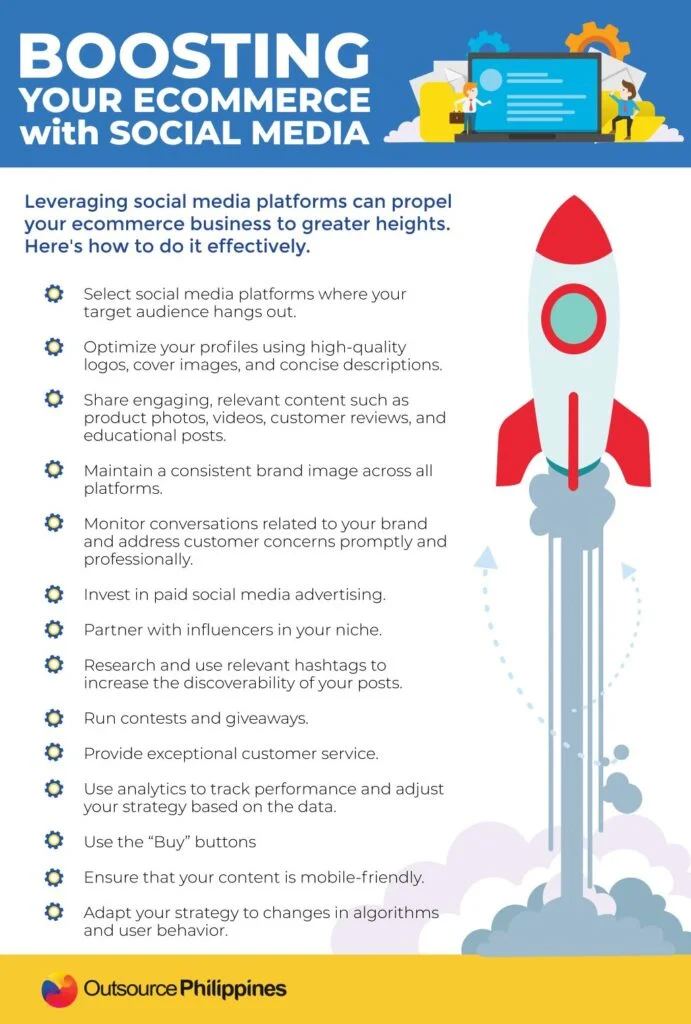Social media platforms have enormously influenced the world today. A video posted today could get millions of views and reactions overnight, and it could even become a trend. This is one of the reasons ecommerce businesses continually tap the potential of social media platforms.
If you haven’t discovered the benefits of social media platforms for ecommerce, you are also slowly turning your back on prospects, revenues, and sales. Here’s the thing: You still have time to delve into social media for ecommerce and make it the way to expand your business, regardless of whether you are a startup or an established one.
In this article, we will take a look at the best social media for ecommerce, the top-notch social media platforms for ecommerce, how to use these avenues, and the benefits and drawbacks we get when we use them for ecommerce. Let’s go!

The Best Social Media for Ecommerce
The three greatest social media for ecommerce are Facebook, Instagram, and Pinterest. Tapping the potential of these avenues to be of tremendous help, regardless of the types of goods or services you provide, your target market, or your marketing plan.
- Facebook: Due to the way people use Facebook, Facebook ads, and shops, Facebook’s potential for online commerce is still undeniable.
- Instagram: This social media platform for ecommerce is all about visual content; each post and profile is built around images and videos.
- Pinterest: Similar to Instagram, you can use a vertical or square image format to display your products as well as the content. Additionally, you can publish brief videos and product collectives.

Best Social Media Platforms for Ecommerce
You can utilize social media marketing as a pathway to increase brand recognition, consumer engagement, and revenue. Concentrate your marketing efforts on these top-notch platforms to get the most return on investment from your social media accounts.
1. Facebook
The most widely utilized social networking site worldwide is Facebook. Due to Facebook’s immense size, ecommerce firms can execute effective sponsored advertising campaigns there. Facebook is an excellent platform to look for if you’re wanting to increase brand recognition for your ecommerce store.
2. Instagram
Instagram is a site that emphasizes visual content, making it a wise channel to employ if you sell things that you can highlight with photos and videos.
It has become a crucial marketing tool for many ecommerce firms because features like Instagram Shopping, which is accessible in a variety of international countries, enable you to build an immersive storefront that lets users explore products with a single tap.
3. Pinterest
Pinterest an underutilized ecommerce marketing channel. Famous for its wide selection of aspirational and highly graphic postings, the site serves as a haven for product discovery and a very successful full-funnel marketing channel. It has a feature like Rich Pins, which you can use to direct potential clients to everything from DIY ideas to skincare items.
4. YouTube
YouTube is the most widely used video site in the world, with an estimated 2.1 billion monthly active users. Research estimates that 68% of consumers have made a purchase after viewing a brand on YouTube. Nonetheless, perseverance is essential. Prior to seeing results on YouTube, you must first grow your audience. By working with influencers, you can increase your subscriber count quickly.
5. TikTok
This perfect social media platform for ecommerce has gained widespread popularity in recent years, and its 1 billion active users in more than 150 countries make it a viable marketing platform for ecommerce firms. They introduced TikTok for Business in 2020, allowing company owners to link their online store and TikTok account. Utilizing hashtags and working with influencers on TikTok will help you engage both potential and current customers.
6. Snapchat
Snapchat has a lot of potential for ecommerce firms, especially those catering to Gen Z and Millennial consumers, with its 363 million daily active users.
Snapchat offers a variety of ad types, including story ads, collection ads, dynamic ads, lens ads, and filter ads, that you may use to target your customers. Given that the typical Snapchatter uses the platform for 30 minutes a day, you’ll have plenty of chances to use your ads to increase engagement.
7.Twitter
Twitter has an older user base than TikTok, Snapchat, and Instagram, with 63% of its users being between the ages of 35 and 65. Therefore, Twitter is a medium you’re likely to reach them on if your target consumer is over 35. Product videos, photos, and freebies are the best ways for ecommerce firms to increase engagement on Twitter. All of these may be boosted with influencer partnerships and strategically placed hashtags.

How to Use Social Media Platforms for Ecommerce
Given the enormous potential of social media platforms in marketing, the question now boils down to: How can they be used effectively for ecommerce? Let’s take a look at the following ways:
1. Raise brand recognition.
It’s an excellent venue for promoting your recently opened business, products, services, events, or promotions. Create a consistent posting strategy with a united voice and message in order to successfully build brand awareness.
2. Promote.
The most productive promotional medium now in use is social networking. Social media commercials have a huge and rapidly growing audience.
3. Directly market on social media.
Social commerce is now simpler than ever. There are now four social media applications with native integrated support for social selling: Facebook, Instagram, Pinterest, and TikTok.
4. Use an ecommerce chatbot to boost sales.
Brands have to make certain they leverage customer support as well as their social media presence and revenue potential. They can create FAQs or assist customers in the buying process.
5. Focus on customer service.
Social media channels are excellent for maintaining and assisting current clients. As a result, they now serve as the primary method of customer service for the majority of well-known brands.
6. Exert efforts on social engagement.
Searching social media for mentions of your business or pertinent conversations is known as social listening. It is an effective technique to monitor and comprehend the needs of their clients.

Download the infographic about the Tips on Using Social Media Platforms for Ecommerce
Benefits of Tapping Social Media for Ecommerce
With the huge impact of social media on businesses, how can it help your ecommerce presence? The following are the advantages of tapping social media for ecommerce:
1. You get access to authentic reviews.
Good and reliable product reviews from actual customers can be found in the comments below the products. The strength of social media is that each profile is highly personalized, and when someone comments, it lends credibility to the profile.
2. It creates a brand and fosters engagement.
Personal interaction and experience sharing lead to loyalty and trust. By interacting with customers and demonstrating your availability to help them when they need it, social commerce will support the development of your brand on social media.
3. You can reach shoppers on the go.
It sounds like you shop on your phone. Yes, more than 3/4 of social media users use smartphones or tablets to access sites. It fits very well with Generation Z, which, as you are already aware, is increasingly accustomed to purchasing online.
4. You keep abreast of globalization.
Social media is a trend that isn’t going anywhere. And with globalization, you can go worldwide with your ecommerce. You can select the audience wherever you want on the platform, which is available in a hundred different languages.

Drawbacks of Social Media for Ecommerce
Although the benefits of using social media platforms for ecommerce to market your business is evidently striking, there are still drawbacks behind and these are:
1. It can be time-intensive.
The company spends a lot of time trying to engage customers. Hence, they need to keep an eye on audience interactions and content. Simply setting up a store on social media is insufficient. A business also wants to establish a brand there because fewer people are seeing the website.
2. Your campaign can only achieve minimal natural reach.
Advertising plays a critical role in generating sales. Organic reach is gradually shrinking as advertising takes control. Advertising is the main method of marketing, though it may differ between platforms.
3. Your brand can get tarnished by negative comments.
Brands are tarnished by bad reviews, and it is difficult to restore their reputation.
4. Social media channels can be ultimately limiting.
Only social media channels are included. It has a broad reach, but it also has limitations. For this reason, you must still maintain a standard online store.
Find the Ideal Social Media Platform for Ecommerce with Outsource-Philippines
Your brand can greatly benefit from selecting the ideal social media outlet for your ecommerce operation. However, it can also be detrimental if poorly handled. With Outsource-Philippines’ social media marketing services, you can utilize social media to the fullest and in the right way to gain the best results, which will blossom your ecommerce store. Have a phone consultation now.










